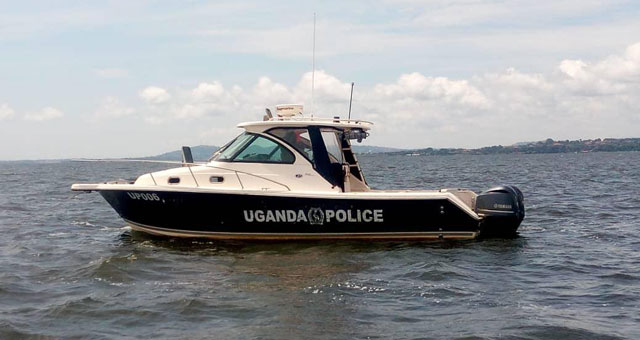
Jinja, Uganda | THE INDEPENDENT | The Minister for Works and Transport, Gen. Katumba Wamala says Ministries and agencies must work jointly to eliminate adhoc search and rescue operations on water bodies.
He says agencies should support Marine Police and get involved whenever there are incidents and accidents on water bodies because more lives can be saved.
Usually, it is local communities, fishermen and boat operators who lead operations and later marine police, which Katumba says can be improved by better coordination of key stakeholders.
He made the statement after inaugurating the National Aeronautical and Maritime Search and Rescue Committee on Thursday at Fisheries Training Institute in Entebbe municipality. The committee is made up of 16 officials from the ministries of works, health, finance, defence, local government, internal and foreign affairs and Uganda Civil Aviation Authority-UCAA.
Katumba noted that the composition of the committee and subcommittees are timely because most of the search and rescue missions on water have been adhoc. He cited the example of November 24th, 2018 when MV Templar sank, killing 33 passengers while 26 people were rescued mainly by the local communities including a village chairman and fishermen.
He noted that more people could have been saved if there had been a coordinated team of various government agencies. For instance, UCAA would have deployed its marine boats to the scene, since it had three boats at the time.
The committee is chaired by the Permanent Secretary Ministry of Works and Transport.
General Katumba says it is good that the committee and technical committee has officials from the army and Police namely Airforce, Police Airwing, Uganda National Meteorological Authority-UNMA, Uganda Revenue Authority and the Directorate for Immigration and Citizenship Control because they will now know that they have to first save lives before asking questions such as what goods they were carrying on board, their nationality among others.
“The national Search and Rescue Policy states that Uganda shall endeavour to provide these services to any person, craft and ship in distress at any place and at all times without regard of nationality, race or circumstances in which the person is found,” he added.
The committee is expected to advise the Works Minister in determining the necessary broad policy required to achieve an efficient aeronautical and maritime search and rescue organisation, coordinating efforts of the relevant ministries, departments and agencies and pooling of resources and making policy decisions on matters that cannot be resolved by subcommittees (aeronautical and maritime) and working groups.
Katumba added that the committee has been created so that Uganda complies with the Convention on International Civil Aviation, 1944, the Chicago Convention,1944 and International Convention on Maritime Search and Rescue, 1979.
Olive Birungi Lumonya, the Deputy Director General at UCAA, noted that the creation of the National Aeronautical and Maritime Coordinating Committee is a key component in fulfilling the International Civil Aviation Organisation -ICAO requirements.
These include Article 25 of the Chicago Convention, 1944 which requires state parties to provide measures of assistance to aircrafts in distress in its territory and also complying with Annex 12 of the same convention which deals specifically with search and rescue. This annex requires state parties to among others create a Rescue Coordination Centre or sub centre using available personnel and facilities to locate and retrieve persons in distress, provide for their initial medical or other needs and deliver them to a place of safety.
She noted that apart from the national aeronautical search and rescue centre based at the Air Control Tower in Entebbe International Airport, sub centres have been established at Gulu and Soroti to extend services across the country.
General Katumba also launched the Maritime Coordination Centre which operates a call centre at Fisheries Training Institute.
Henry Ategeka, the Principal Marine Inspector at the Works Ministry, said that the call centre will have ten staff who work day and night. “The call centre is accessible via a voice call code 110 and is responsible for receiving all calls reporting maritime distress incidents within Uganda waterways and dissemination of information to the relevant stakeholders,” Ategeka said as he led Katumba and other officials into the call centre.
The staff led by Caroline Mbabazi noted that they are currently test running the systems although they have over 13,000 received calls i two months which were mostly on unrelated issues such as requests to withdraw mobile money.
However, Rev.Samuel Zacheus Atabua, the Chief Fire Officer at UCAA, urged the call centre workers to always share correct coordinates of callers with search and rescue officers for successful operations especially at night.
He noted that the fire and rescue department at Entebbe Airport one time received a call of distress from someone claiming their water vessel was sinking on Lake Victoria. However, the team was unable to carryout operations because the coordinates of the phone call indicated that the caller was in Egypt.
He also said that the Ministry is also in the process of commencing the construction of a Maritime Rescue Coordination Center to coordinate search and rescue activities and also set up nine local search and rescue stations on Lake Victoria, Lake Kyoga and Lake Albert.
****
URN
 The Independent Uganda: You get the Truth we Pay the Price
The Independent Uganda: You get the Truth we Pay the Price





